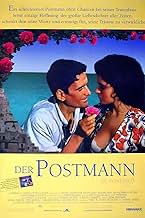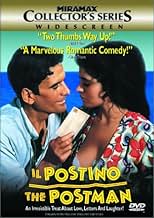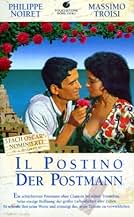AVALIAÇÃO DA IMDb
7,8/10
41 mil
SUA AVALIAÇÃO
Um carteiro italiano aprende a amar poesia enquanto entrega correspondência a um poeta famoso, e começa a usar isso para cortejar a bela Beatrice.Um carteiro italiano aprende a amar poesia enquanto entrega correspondência a um poeta famoso, e começa a usar isso para cortejar a bela Beatrice.Um carteiro italiano aprende a amar poesia enquanto entrega correspondência a um poeta famoso, e começa a usar isso para cortejar a bela Beatrice.
- Direção
- Roteiristas
- Artistas
- Ganhou 1 Oscar
- 31 vitórias e 20 indicações no total
Calogero Azzaretto
- Bookseller
- (não creditado)
Simona Caparrini
- Elsa Morante
- (não creditado)
Angelo Casadei
- Cinema Spectator
- (não creditado)
Chuck Riley
- Narrator of Theatrical Trailer
- (narração)
- (não creditado)
Avaliações em destaque
Although "Il Postino" simply means "The Postman", and although the film was at one time screened as "The Postman" in Britain, it is now generally known in English by its Italian title to avoid confusion with Kevin Costner's post-apocalyptic epic from three years later. It is loosely based upon the novel "Ardiente paciencia" by the Chilean writer Antonio Skármeta, although it transfers the action from Chile to Italy. It takes as its starting-point the fact that in the early 1950s the famous Chilean poet Pablo Neruda, in exile from his homeland for political reasons, spent some time on the island of Capri. The film, however, is not set on Capri but on an unnamed Italian island.
A young fisherman named Mario Ruoppolo applies for a job as the island's postman. As he owns a bicycle and is one of the very few islanders who can read and write he is accepted and is told that he will only have one customer, Neruda himself, as because of the low levels of literacy on the island nobody else ever receives any mail. (Were standards of education really so low in fifties Italy?)
Although Mario has never previously heard of Neruda, and certainly has never read any of his poems, a friendship gradually grows up between the two men. Although Mario has had little formal education he is clearly an intelligent and sensitive man, and Neruda reads him some of his poetry (in Italian translation), teaching him about literary concepts such as metaphors. With Neruda's help Mario woos the beautiful Beatrice, a village girl with whom he has fallen in love, stealing some of the older man's love poems and passing them off as his own in order to win her affections.
My one criticism of the film would be that it is too sentimental about Communism, but that is perhaps only to be expected of a film from Italy, a country which at one time had the largest Communist Party in Western Europe. (In the seventies they used to win around a third of the popular vote, at a time when the British Communist Party generally consisted of three old men and a dog). Pablo Neruda is here portrayed as a kindly, idealistic gentleman, but in reality, during the forties and early fifties, he was a Communist hardliner who enthusiastically defended Stalin's dictatorship in the Soviet Union. After Khrushchev's 1956 "secret speech" he was to criticise the Stalinist cult of personality but this was due less to a change of heart than to a desire to align himself with the new official Soviet party line. He was also, at the time of his Italian exile, around twenty years younger than the character portrayed here by Philippe Noiret.
Its politics aside, however, "Il Postino" is in many ways an excellent film. There is some attractive photography of the Italian coastal scenery and a great musical score by Luis Enríquez Bacalov. What really makes the film stand out, however, are the two great performances from Noiret and from Massimo Troisi, who tragically died of a heart attack soon afterwards, as Mario. There is also a good performance from the lovely Maria Grazia Cucinotta as Beatrice. Troisi received a posthumous Oscar nomination for "Best Actor", but lost out to Nicholas Cage in "Leaving Las Vegas"; as I have never seen that film I am unable to comment on the justice of that decision. I felt, however, that it was unfortunate that there was no nomination for Noiret either as "Best Actor" or "Best Supporting Actor". Indeed, this is one of those films which make me feel that it should be possible to nominate two actors for a joint award, as Noiret and Troisi combine together so well that their joint contribution seems greater than the sum of its two parts. This is the story of a touching relationship between two men of different generations, of different nationalities, of different levels of education and of different outlooks on life who are nevertheless united in friendship. 8/10
A young fisherman named Mario Ruoppolo applies for a job as the island's postman. As he owns a bicycle and is one of the very few islanders who can read and write he is accepted and is told that he will only have one customer, Neruda himself, as because of the low levels of literacy on the island nobody else ever receives any mail. (Were standards of education really so low in fifties Italy?)
Although Mario has never previously heard of Neruda, and certainly has never read any of his poems, a friendship gradually grows up between the two men. Although Mario has had little formal education he is clearly an intelligent and sensitive man, and Neruda reads him some of his poetry (in Italian translation), teaching him about literary concepts such as metaphors. With Neruda's help Mario woos the beautiful Beatrice, a village girl with whom he has fallen in love, stealing some of the older man's love poems and passing them off as his own in order to win her affections.
My one criticism of the film would be that it is too sentimental about Communism, but that is perhaps only to be expected of a film from Italy, a country which at one time had the largest Communist Party in Western Europe. (In the seventies they used to win around a third of the popular vote, at a time when the British Communist Party generally consisted of three old men and a dog). Pablo Neruda is here portrayed as a kindly, idealistic gentleman, but in reality, during the forties and early fifties, he was a Communist hardliner who enthusiastically defended Stalin's dictatorship in the Soviet Union. After Khrushchev's 1956 "secret speech" he was to criticise the Stalinist cult of personality but this was due less to a change of heart than to a desire to align himself with the new official Soviet party line. He was also, at the time of his Italian exile, around twenty years younger than the character portrayed here by Philippe Noiret.
Its politics aside, however, "Il Postino" is in many ways an excellent film. There is some attractive photography of the Italian coastal scenery and a great musical score by Luis Enríquez Bacalov. What really makes the film stand out, however, are the two great performances from Noiret and from Massimo Troisi, who tragically died of a heart attack soon afterwards, as Mario. There is also a good performance from the lovely Maria Grazia Cucinotta as Beatrice. Troisi received a posthumous Oscar nomination for "Best Actor", but lost out to Nicholas Cage in "Leaving Las Vegas"; as I have never seen that film I am unable to comment on the justice of that decision. I felt, however, that it was unfortunate that there was no nomination for Noiret either as "Best Actor" or "Best Supporting Actor". Indeed, this is one of those films which make me feel that it should be possible to nominate two actors for a joint award, as Noiret and Troisi combine together so well that their joint contribution seems greater than the sum of its two parts. This is the story of a touching relationship between two men of different generations, of different nationalities, of different levels of education and of different outlooks on life who are nevertheless united in friendship. 8/10
I've never seen him in anything else, but this performance by Massimo Troisi touches my soul. Stunning.
his performance is essence of this adorable film. his character is so careful created that its fragility, humor, innocence, light of details are magnificent. he don't play a role but he is "il postino" . and this fact transforms entire scene. the story of Neruda exile is only arena for emotions of a small man on an Italian isle. the beautiful Beatrice is brick for his delicate happiness. Neruda himself is not exactly a mentor but a gardener. and the music, the extraordinary music, it is the soul of entire poetry. because a poetry is this movie who has as roots poems. very delicate, nice, nostalgic, melancholic, subtle, intelligent, precise, it is wonderful homage to a way to discover life as fundamental miracle. to feel the nuances of love, friendship, to be humble, modest and daring in same time, to feel gratitude as form of respiration. beautiful and impressive. touching. and unique. story of a postman. legacy of Massimo Troisi.
Set in the early 1950s on a small Italian island, there are three central characters in this movie, one real and the other two fictional. The real one is Chilean poet Pablo Neruda (played by French actor Noiret who resembles Neruda quite nicely). Neruda died in 1973, but really did spend several years in exile in Italy, and really is a world-famous poet.
In this fictional story, simple and honest, but somewhat dim, 40-something Mario Ruoppolo (Massimo Troisi, who died of heart failure right before the movie was released) is the son of a small time fisherman. Mario really doesn't like the fishing, but has no job. At dad's encouragement, he finds a temporary job as a postman, "il postino." The famous poet is moving into the small village and a man with a bicycle is needed to deliver his mail daily. It pays very little in this poor village, but it is a job. And the friendship that eventually develops between Neruda and Mario changes their lives.
The third central character is pretty and sexy 20-something Beatrice (Maria Grazia Cucinotta) who works in her fiercely protective aunt's bar and restaurant. Mario admires her from afar, but Neruda's poetry gives Mario an entry. He tells Neruda later, "Poetry doesn't belong to those who write it, it is for those who need to use it."
A very charming and meaningful movie on DVD for those who don't mind reading English subtitles. Or, listen to it in Italian or French. Some of my favorite scenes were the conversations between Mario and the poet when the mail was delivered.
SPOILERS FOLLOW. Mario manages to win the affections of Beatrice through his poetry and they marry. The political climate changes in Chile allowing Neruda to return there. Mario is sad that Neruda does not seem to remember them. But he turns up perhaps 6 or 8 years later, meets Mario's young son and Beatrice, but finds that Mario had died in a rumble during a Communist rally in the square. The movie ends with Neruda on the beach where he and Mario had had so many wonderful conversations, reflecting on the beauty of the island and how it influenced his poetry. And the friendship with Mario.
In this fictional story, simple and honest, but somewhat dim, 40-something Mario Ruoppolo (Massimo Troisi, who died of heart failure right before the movie was released) is the son of a small time fisherman. Mario really doesn't like the fishing, but has no job. At dad's encouragement, he finds a temporary job as a postman, "il postino." The famous poet is moving into the small village and a man with a bicycle is needed to deliver his mail daily. It pays very little in this poor village, but it is a job. And the friendship that eventually develops between Neruda and Mario changes their lives.
The third central character is pretty and sexy 20-something Beatrice (Maria Grazia Cucinotta) who works in her fiercely protective aunt's bar and restaurant. Mario admires her from afar, but Neruda's poetry gives Mario an entry. He tells Neruda later, "Poetry doesn't belong to those who write it, it is for those who need to use it."
A very charming and meaningful movie on DVD for those who don't mind reading English subtitles. Or, listen to it in Italian or French. Some of my favorite scenes were the conversations between Mario and the poet when the mail was delivered.
SPOILERS FOLLOW. Mario manages to win the affections of Beatrice through his poetry and they marry. The political climate changes in Chile allowing Neruda to return there. Mario is sad that Neruda does not seem to remember them. But he turns up perhaps 6 or 8 years later, meets Mario's young son and Beatrice, but finds that Mario had died in a rumble during a Communist rally in the square. The movie ends with Neruda on the beach where he and Mario had had so many wonderful conversations, reflecting on the beauty of the island and how it influenced his poetry. And the friendship with Mario.
A beautiful movie that does an excellent job bringing to life Neruda's love poems and how they touch the life of a simpleton postman. It inspires in one, a spiritual and sensual love for poetry. The music is intricately woven into the fabric of the story, and is surely a high point in the movie. Great cinematography, matched frame by frame with the splendid acting, especially that of Massimo Troisi and Philippe Noiret. Watch this movie if you are disillusioned with the notion of romance, and need some succour.
The movie once again reinforces my admiration for the Italian film-makers. What amazes me is their simplicity in relating a tale, and how subtly pathos is displayed in their movies. This is also evidenced in "Life is Beautiful" and "The Bicycle Thief".
The movie once again reinforces my admiration for the Italian film-makers. What amazes me is their simplicity in relating a tale, and how subtly pathos is displayed in their movies. This is also evidenced in "Life is Beautiful" and "The Bicycle Thief".
Você sabia?
- CuriosidadesWriter/co-director/star Massimo Troisi postponed heart surgery so he could complete the film. The day after filming was complete, he suffered a fatal heart attack.
- Citações
Mario Ruoppolo: Poetry doesn't belong to those who write it; it belongs to those who need it.
- Versões alternativasThe Italian version of the film includes an additional title credit for Massimo Troisi, listed as co-director of the movie together with Michael Radford.
- ConexõesEdited into Laggiù qualcuno mi ama (2023)
- Trilhas sonorasMadreselva
Written by Francisco Canaro (as F. Canaro) and Luis César Amadori (as L.C. Amadori)
Performed by Carlos Gardel
Courtesy of E. Musical Pirovano
Principais escolhas
Faça login para avaliar e ver a lista de recomendações personalizadas
Detalhes
- Data de lançamento
- Países de origem
- Centrais de atendimento oficiais
- Idiomas
- Também conhecido como
- The Postman
- Locações de filme
- Pollara, Salina Island, Aeolian Islands, Messina, Sicily, Itália(rural and beach scenes)
- Empresas de produção
- Consulte mais créditos da empresa na IMDbPro
Bilheteria
- Orçamento
- US$ 3.000.000 (estimativa)
- Faturamento bruto nos EUA e Canadá
- US$ 21.848.932
- Fim de semana de estreia nos EUA e Canadá
- US$ 95.310
- 18 de jun. de 1995
- Faturamento bruto mundial
- US$ 21.901.623
- Tempo de duração
- 1 h 48 min(108 min)
- Cor
- Mixagem de som
- Proporção
- 1.66 : 1
Contribua para esta página
Sugerir uma alteração ou adicionar conteúdo ausente































